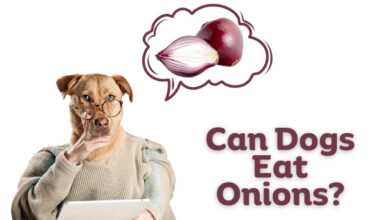
If you’re a dog owner, you’ve probably wondered whether it’s okay to share a tasty snack with your furry friend. French fries, a beloved treat for many, might seem like an innocent choice for your dog. But before you offer them a bite, it’s important to ask: Can dogs eat French fries? While it might be tempting to toss your dog a few fries from your plate, there are hidden dangers you may not know about. French fries, especially the fried variety, can pose serious health risks to your dog’s well-being.
In this article, we’ll uncover five critical dangers you should be aware of before giving your dog that salty snack. Keep reading to ensure your dog’s safety and happiness when it comes to their diet.
Can Dogs Eat French Fries?

No, dogs should not eat French fries. While a small bite now and then might not hurt, it’s not a good idea to feed them regularly.
French fries are high in fat, salt, and calories—none of which are good for your dog. Too much fat can cause weight gain and even lead to pancreatitis, a painful condition. The salt can dehydrate your dog or, in severe cases, cause poisoning. Fries may also have spices like garlic or onion powder, which are toxic to dogs.
If you want to give your dog a treat, choose a healthier option instead. If you do offer a fry, make sure it’s plain, without seasoning, and not cooked in oil. But it’s best to stick with safe, dog-friendly snacks.
5 Hazards of Feeding French Fries to Your Dog
Feeding your dog French fries might seem like a harmless treat, but it can lead to some serious health issues. Here are five risks you should consider:
- Allergic Reactions: Some dogs may be allergic to potatoes, whether fresh or fried. Symptoms like hives or swelling may appear if your dog has an allergic reaction. Sweet potatoes are a safer alternative when cooked properly, so stick with those if you want to offer a similar treat.
- Salt Content Complications: French fries are loaded with salt. While it would take a lot to cause salt poisoning, small breeds are more vulnerable. Even a small increase in salt intake can cause dehydration, excessive thirst, high blood pressure, and more frequent urination. And condiments like ketchup? They add extra salt and sugar that are harmful to your dog.
- Inflammatory Responses: The unhealthy fats in the oils used to fry French fries, like canola or vegetable oil, can cause your dog’s stomach to react. These fats can contribute to severe conditions like canine bloat, which is life-threatening, or even pancreatitis if consumed regularly.
- Upset Stomach: Fried foods are high in carbs, which can cause digestive issues for your dog. Just like humans, dogs can experience gastrointestinal distress from eating too many high-carb foods.
- Weight Gain: Regularly giving your dog fatty, high-carb foods like French fries can cause them to gain unwanted weight. To help maintain their ideal weight, stick to dog food that meets their nutritional needs, as recommended by your vet.
French fries might be tasty for us, but they’re not the best choice for your dog’s health. Choosing safe, dog-friendly treats is always a better option.
Potato Allergies in Dogs
Potato allergies in dogs can cause symptoms like itching, redness, or rashes on the skin, digestive problems like vomiting and diarrhea, and ear infections. Some dogs may also experience swelling, hives, or even difficulty breathing in severe cases. If you suspect your dog is allergic to potatoes, stop feeding them and consult your vet for proper guidance. They can help determine if potatoes are the cause and suggest safe alternatives.
Can Dogs Eat Sweet Potato Fries?
Sweet potato fries may seem like a healthier option compared to regular fries, with a few extra vitamins packed in. However, they’re still not a safe treat for dogs. Just like regular fries, sweet potato fries are usually cooked in fatty oils and often seasoned with salt, which makes them unsuitable for your pup.
If you want to share sweet potatoes with your dog, try making them at home without any harmful seasonings or toppings. Instead of fries, consider offering your dog plain, cooked sweet potatoes. Boiled or steamed sweet potatoes are a much healthier choice and provide all the nutrition without the added fats or salt.
Your dog will love the tasty treat, and you’ll feel good knowing it’s a healthy, safe option!
My Dog Ate French Fries. Now What?
Potatoes themselves aren’t harmful to dogs, but when cooked as French fries, they can cause problems. The oil and salt added during cooking are what make fries unhealthy for your dog. A small bite of plain boiled or baked potato is usually safe, but fries are a different story.
If your dog eats one or two fries, it’s not usually something to worry about. While they’re not healthy, your pet will likely be fine, especially if the fries were plain and unseasoned. Keep an eye out for any signs of discomfort, like vomiting, diarrhea, or lethargy. If any of these symptoms show up, it’s a good idea to call your vet.
However, if your dog eats a large number of fries or fries seasoned with garlic salt, it’s best to contact your vet right away. Whether a visit to the vet is necessary depends on how the fries were prepared, how many were eaten, and your dog’s size and health. Your vet will be able to guide you on the best course of action.
What To Feed Your Dog Instead of French Fries
It’s tempting to share your fries with your dog, but there are many healthier, dog-friendly alternatives that can satisfy their snack cravings without the risks. Here are some great options:
- Carrot sticks: Crunchy and full of vitamins, carrots make an excellent low-calorie alternative to fries.
- Sweet potato bites: Baked or air-fried sweet potato chunks have a similar texture to fries but without the harmful oils or seasonings. Just skip the salt and garlic, and offer them in moderation.
- Green beans: Steamed or raw, green beans are a great low-calorie snack packed with fiber.
- Pumpkin: Plain, cooked or canned pumpkin is a healthy treat that’s easy to serve. Try freezing some in a Kong® toy for a “pupsicle,” or mix it with their regular food for a tasty twist.
- Zucchini spears: Slice zucchini into fry-like shapes, sauté, and you have a healthy alternative that your dog will enjoy.
- Apple slices: Crisp, fiber-rich apple slices are a sweet and crunchy treat. Just be sure to remove the seeds and core, as they can be harmful to dogs.
- Blueberries: These little superfoods are packed with antioxidants and are a great, safe snack for your dog.
- Air-popped popcorn: Plain, air-popped popcorn (without salt, butter, or seasonings) is a light, low-calorie snack. Just be sure to offer it in small amounts.
- Frozen banana slices: Freeze banana slices for a cool, refreshing treat your dog will love.
Whenever you introduce a new food, start slowly by offering just a few small bites. This way, you can check for any signs of stomach upset before giving more.
Remember the 10% rule: Treats should only make up about 10% of your dog’s daily calorie intake. Their main nutrition should come from a high-quality dog food that meets all their needs.
If you’re ever unsure about whether a specific food is safe for your dog, talk to your vet. They can help guide you on what treats are best for your dog’s health and nutrition.
Think Before You Share: Keeping Your Dog Safe
Not all human foods are safe for dogs, and some can cause serious health problems. While it may be tempting to share a bite of your French fries with your furry friend, it’s important to pause and think about the potential risks. Some foods can trigger allergic reactions, upset their stomach, or even lead to long-term health issues.
Before offering your dog a treat from your plate, always check with your veterinarian. Even though some foods might be fine in small amounts, others can be harmful. Remember, your dog’s well-being should always come first. Feeding them a balanced diet tailored to their needs is the best way to keep them healthy.
This article is meant to provide helpful information, but it’s not a substitute for professional advice. When in doubt, always consult your vet before sharing food with your dog.
FAQS.
Can dogs eat French fries?
No, dogs should not eat French fries. They are high in fat, salt, and sometimes harmful seasonings, which can cause digestive issues or long-term health problems like obesity and pancreatitis.
What happens if my dog eats a French fry?
If your dog eats a French fry, they may experience upset stomach, vomiting, or diarrhea. Monitor them for discomfort, and contact a vet if symptoms persist or worsen.
Will one French fry hurt my dog?
One French fry is unlikely to hurt your dog, but it’s not a healthy treat. Too many fries can lead to digestive upset or other health issues like weight gain.
What would happen if a dog ate McDonald’s fries?
McDonald’s fries contain salt and fat, which can cause dehydration, vomiting, or diarrhea. If your dog eats too many, it could lead to more serious health issues. Call your vet if you’re concerned.
Are French fried onions toxic to dogs?
Yes, French fried onions are toxic to dogs. They contain garlic or onion powder, which can cause lethargy, vomiting, and even more severe issues like organ damage.
Can I give my dog a French fry from McDonald’s?
It’s best not to give your dog a French fry from McDonald’s. The high salt, fat, and additives make them an unhealthy treat for your dog. If you do, make sure it’s plain and in moderation.
Can I give my dog a couple of French fries?
While one or two plain French fries might not harm your dog, it’s not recommended. French fries are high in fat and salt, which can lead to stomach upset and other health issues.
What to feed your dog instead of French fries?
Try healthier alternatives like carrot sticks, green beans, or plain boiled sweet potatoes. These options are nutritious, low in fat, and safer for your dog than French fries.
Related Posts:
Is Jasmine Rice Good for Dogs? Health Benefits Explained
Can Dogs Eat Honeydew Melons? Benefits, Risks, and Safe Feeding Tips
Can Dogs Eat Mussels? Benefits and Safe Prep Tips
Can Dogs Eat Meatballs? Vet-Approved Tips and Nutrition Advice
Can Dogs Eat Raw Fish? Risks, Benefits, and Safety Tips
Can Dogs Eat Raspberries? Find Out the Truth About This Sweet Treat!
Can Dogs Eat Hard-Boiled Eggs? Discover the Surprising Benefits!




